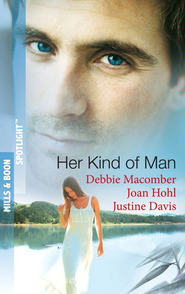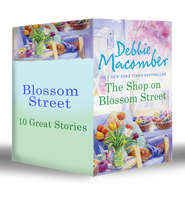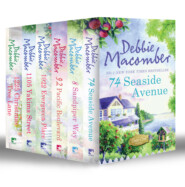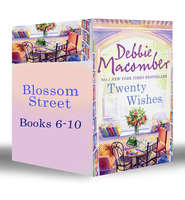По всем вопросам обращайтесь на: info@litportal.ru
(©) 2003-2024.
✖
Not Just For Christmas
Автор
Год написания книги
2018
Настройки чтения
Размер шрифта
Высота строк
Поля
“You attended that?” His mother sounded pleased.
“Sure, why not?” His response was flippant, as though this was the very thing he’d normally do. In truth, though, Vaughn couldn’t recall attending anything like it since he was in grade school. The evening had been quite an experience. The whole town had come alive with music and laughter and people enjoying one another’s company. Christmas had never been a big deal to Vaughn—but he’d never seen an entire community join together like this, either. He knew it had made a lasting impression on him, that it left him longing for the same kind of warmth. For a true spirit of celebration, far removed from sophisticated parties and decorator-trimmed trees.
“How is Hassie?” his mother asked.
Vaughn wasn’t sure what to say. Hassie was without a doubt one of the most dynamic women he’d ever met. She possessed character and depth and a heart that poured out love for her family and her community. He’d immediately seen how deeply she was loved and respected. After these hours in her company, Vaughn had understood why. “She’s an extraordinary woman.”
“I know.” His mother’s voice was soft, a little tentative. Before Vaughn could say more, she’d retreated into the living room.
Vaughn followed and his father muted the television, obviously waiting for him to enlighten them about his visit.
“Hassie let me read the letters her son wrote from Vietnam.”
His mother resumed her needlepoint and lowered her head, as though the stitches demanded her full attention.
“They were riveting. I learned about the war itself, things I could never have learned from a book, and about the man who wrote them.” At the time, Hassie’s son had been younger than Vaughn was now. In his letters, Vaughn had recognized the other man’s sense of humanity, his hatred of war and his desire to make a difference, to share in a struggle for freedom.
“We met at the University of Michigan during our freshman year of college,” his father said, and his eyes went blank. He seemed to be back in a different place, a different time. Vaughn knew he hadn’t been accepted into the service himself because of poor eyesight. “He was my roommate. Both of us were away from home for the first time and in an environment completely foreign and unfamiliar. I suppose it’s only natural that we became close.”
His mother added in a low voice, “He was the most generous person I’ve ever known.”
“He got a part-time job tutoring a youngster who had leukemia,” his father continued, his gaze focused on the television screen. “He was hired for three hours a week, but Vaughn spent much more time with him than that. He played games with Joey, talked to him, cheered him up, and when Joey died at thirteen, the boy’s mother said Vaughn had been his best friend.”
“That’s the kind of person he was,” his mother said.
“Hassie gave me the school letter he earned in wrestling. And then, after I walked her back home, she said there was something else she wanted me to have.” His parents looked up when he paused. Even now, Vaughn could hardly believe Hassie would give him such a gift.
“What, son?”
“Her husband’s gold pocket watch. It would’ve been Vaughn’s had he lived.” Hassie had placed it in his hands with tears filming her eyes, then closed his fingers around it.
“Treasure it, Vaughn,” his mother whispered.
“I do.” Vaughn’s first reaction had been to refuse something that was clearly a valuable family heirloom, something that meant a great deal to the old woman. He’d felt the significance of her gift and was moved by the solemnity of her words and gestures when she’d presented it to him.
He would always keep it safe. And he would pass it down to his oldest son or daughter.
“What else did Hassie tell you?” his father asked.
“She … said how much Vaughn had loved Mom.”
“He did.”
Vaughn studied his father, looking for any sign of jealousy. If he’d been in his father’s shoes—well, he wasn’t entirely sure how he’d feel.
“We planned to marry,” his mother said, “but Hassie probably told you that.”
He nodded. “She showed me the letter in which Vaughn explains why it would be best to wait until he returned from Vietnam.”
“Only, he didn’t return. And everything worked out in a completely different way.” His mother took his father’s hand and held it and they gazed at each other for a moment. “But a good way,” she said quietly.
“I often wondered what Hassie really thought about the two of us getting married,” his father said. He stared at Vaughn as if, after meeting Hassie, he could supply the answer.
Indeed, Vaughn had seen the look that came over her face when she mentioned his parents’ marriage. “At first I think she took it hard.” This didn’t appear to surprise either of his parents.
“Our marriage was a reminder that Vaughn was never coming home,” his mother said, “and that no matter how much pain the world brings us, life continues.”
“She said as much herself.”
“I think … she was disappointed in us both.”
“Perhaps in the beginning,” Vaughn agreed, “but she changed her mind later. She told me she felt that her son approved.”
“I’m sure he did,” his mother whispered.
His father reached abruptly for the remote, indicating that the conversation was over. Sound flared back, and Vaughn got up and went to the kitchen to pour himself a cup of coffee before rejoining his parents.
“Oh, dear, I almost forgot to tell you,” his mother said. “Natalie phoned.”
Vaughn’s first reaction was that he didn’t want to talk to her. Not tonight. Not after such an emotionally overwhelming day. Knowing Natalie, she’d want to discuss business, and that was the last thing on his mind. He needed to think before he returned the call, needed to absorb what he’d learned first—about the town, about Hassie … about himself.
“It isn’t too late to call her back,” his mother said. “With the time difference, it’s barely eight on the West Coast.”
“I know,” he said absently, his thoughts now on Carrie Hendrickson. Much of the evening had been spent with her. After they’d brought hot chocolate to Hassie and Joshua McKenna, she’d introduced him to her family.
Vaughn had seen the wary look in her brothers’ eyes and realized how protective they were of her. He wished he’d had more of a chance to talk to Carrie, but they were constantly interrupted. She was a favorite with her nieces and nephews, who were forever running up to her, involving her in their games and their squabbles. She was a natural peacemaker, he observed, one of those people whose very presence brought out the best impulses in others. Like Hassie. And the people in town valued Carrie in much the same way; that was easy to tell. They came to her for advice and comfort. They were drawn to her just as he was.
“Your father and I are looking forward to meeting Natalie,” his mother said, breaking into his musings.
Vaughn started guiltily. He was as good as engaged—although, he supposed, all they’d really done was discuss the possibility of marriage. He hadn’t divulged his plans to either of his parents. At Natalie’s request, he hadn’t even told them about his job. “She’s anxious to meet you, too,” he said, but without a lot of enthusiasm. The contrast between Natalie and Carrie flashed like a neon sign in his brain. One was warm and personable and focused on the needs of her community, the other sharp, savvy and ambitious. When he’d arrived in North Dakota, he thought he knew what he wanted; all at once, he wasn’t sure.
“You’ve been seeing her for two years now,” his mother went on, watching him.
“Barbara, the boy doesn’t need you to tell him that.”
Vaughn sipped his coffee. This was one conversation he had no wish to continue. “Carrie and I are going Christmas shopping tomorrow,” he said, instead.
His mother lowered the needlepoint to her lap and stared at him. “Carrie? Who’s Carrie?”
Vaughn didn’t realize his mistake until it was too late. “A friend.”
His mother raised her eyebrows as if his answer didn’t please her. “When did you have time to make friends?”
“She works with Hassie at the pharmacy.”
“I see.” It appeared his mother did see, because she said nothing more.
Vaughn wished he understood his own feelings. A week ago he would have rushed to return Natalie’s call. He wasn’t avoiding her, he decided, but the subject of Value-X and Buffalo Valley. In a matter of days—one day, really—he’d become oddly protective of the town … and its people. Hassie, of course, but Carrie, too. Natalie was bound to ask him questions he no longer wanted to answer.











